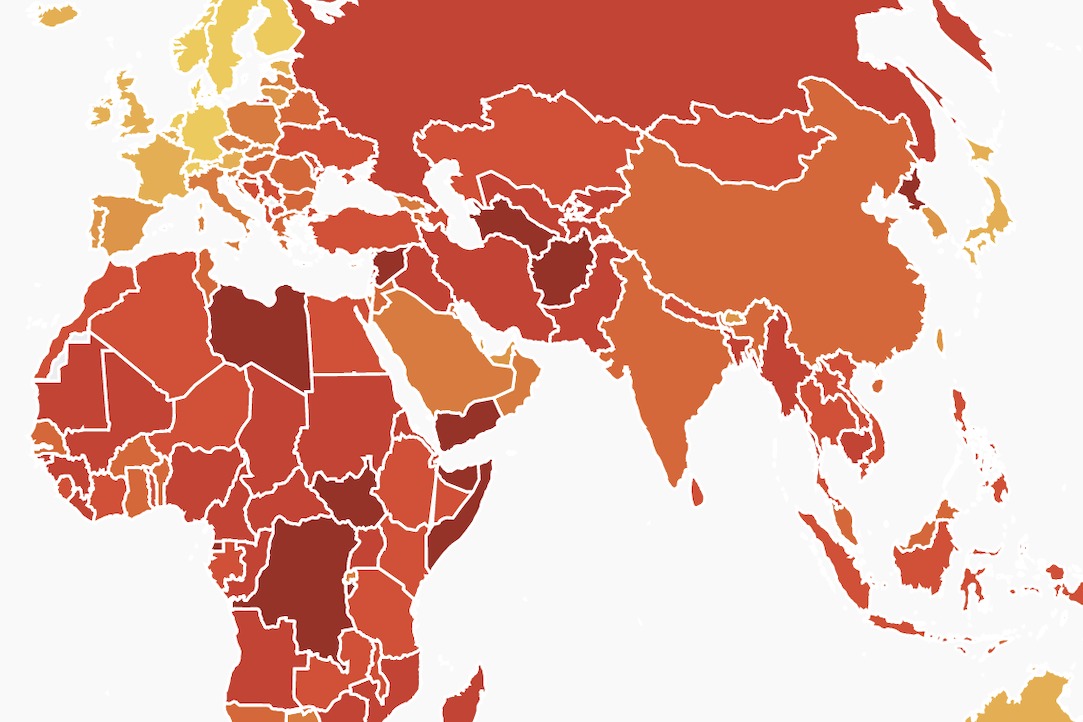
The 2021 Corruption Perceptions Index (CPI) released this week by Transparency International shows that corruption levels remain at a standstill worldwide, with 86 percent of countries making little to no progress in the last 10 years. Nearly two-thirds of nations scored below 50 on the 100-point scale this year. The largest declines among significant countries found by the survey since 2015 include Canada (-9 points), the United States (-9 points), Hungary (-8), Poland (-8), and Australia (-6).
Transparency International found countries that violate civil liberties consistently score lower on the Corruption Perceptions Index. “Complacency in fighting corruption exacerbates human rights abuses and undermines democracy, setting off a vicious spiral. As these rights and freedoms erode and democracy declines, authoritarianism takes its place, contributing to even higher levels of corruption,” said Transparency International in a statement.
The CPI ranks 180 countries and territories by their perceived levels of public sector corruption on a scale of zero (highly corrupt) to 100 (very clean). The top countries on the Index this year are Denmark (88), Finland (88) and New Zealand (88), all of which also rank in the top 10 percent in the world on the Democracy Index civil liberties score. Somalia (13), Syria (13) and South Sudan (11) remain at the bottom of the CPI with this year’s lowest scores. Syria is also ranked last in civil liberties (Somalia and South Sudan are unrated). Twenty-seven countries, including Cyprus (53), Lebanon (24) and Honduras (23), slid to historic lows on the Corruption Perceptions Index this year.
“Human rights are not simply a nice-to-have in the fight against corruption. Authoritarian approaches destroy independent checks and balances and make anti-corruption efforts dependent on the whims of an elite,” said Delia Ferreira Rubio, chair of Transparency International. “Ensuring people can speak freely and work collectively to hold power to account is the only sustainable route to a corruption-free society.”
United States Slipping
The United States scored a 67 on the index, unchanged from last year, but down from its highest score of 76 in 2015. It also dropped out of the top 25 countries for the first tine since the Index was reconfigured in 2012, despite the efforts of enforcing the Foreign Corrupt Practices Act. Twenty-five countries have significantly improved their scores this year, including Estonia (74), Seychelles (70) and Armenia (49).
“As anti-corruption efforts stagnate and deteriorate, human rights and democracy are under attack. This is no coincidence. The continued use by governments of the COVID-19 pandemic to erode human rights and democracy could also lead to sharper declines across the globe in the future,” the report’s authors wrote.
Some other highlights of the report include:
- The Philippines has continued its fall beginning in 2014 to a score of 33, as President Rodrigo Duterte has cracked down on freedoms of association and expression since his election in 2016. It also has an exceptionally high murder rate of human rights defenders, with 20 killed in 2020.
- In Venezuela, the government of President Nicolás Maduro has repressed dissent of political opponents and journalists. The country has significantly declined on the CPI over the last decade, earning its lowest score yet of 14 in 2021.
- Mali has faced political, institutional and security crises, including three military coups during the past 10 years. Its CPI score has dropped to 29 and its civil liberties score is also declining, as ongoing armed conflict undermines key state functions, leading to a vicious cycle of corruption and human rights abuses.
- Even among democracies, the last decade has seen backsliding on both anti-corruption efforts and human rights. Poland’s civil liberties score declined and its CPI score dropped to 56, as the government cracks down on activists through insult laws and severely limits media freedom.
Demanding Change
Transparency International calls on governments to act on their anti-corruption and human rights commitments and for people across the globe to join together in demanding change.
“In authoritarian contexts where control over government, business and the media rests with a few, social movements remain the last check on power,” said Daniel Eriksson, CEO of Transparency International. “It is the power held by teachers, shopkeepers, students and ordinary people from all walks of life that will ultimately deliver accountability.”
The Index scores 180 countries and territories around the world based on perceptions of public sector corruption, using data from 13 external sources, including the World Bank, World Economic Forum, private risk and consulting companies, think tanks and others. ![]()
Joseph McCafferty is editor & publisher of Internal Audit 360°.


